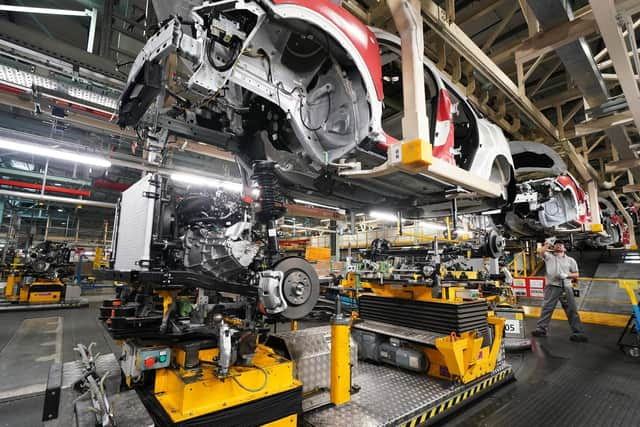GDP: UK economy in 'precarious place' despite surprisingly resilient growth
Official data showed that gross domestic product (GDP) rose by 0.5 per cent in June, aided by a robust manufacturing sector. That result compared with the 0.2 per cent that had been forecast by economists. It meant that the UK economy expanded by 0.2 per cent in the second quarter of the year, against expectations for a flat reading.
The Office for National Statistics’ (ONS) director of economic statistics, Darren Morgan, said: “The economy bounced back from the effects of May’s extra bank holiday to record strong growth in June. Manufacturing saw a particularly strong month with both cars and the often-erratic pharmaceutical industry seeing particularly buoyant growth.”
Advertisement
Hide AdAdvertisement
Hide AdConstruction also grew strongly, the ONS noted, as did pubs and restaurants, with both aided by the warm weather. However, quarterly GDP is still 0.2 per cent below where it was in the final three months of 2019, before the Covid-19 pandemic hit and forced the country into lockdown.


David Bharier, head of research at the British Chambers of Commerce, said: “[This] first estimate for Q2, showing GDP grew by 0.2 per cent is better news than expected, but the UK economy remains in a precarious place. Businesses are continuing to face a worrying mix of high inflation, rising interest rates, a tight labour market and global economic uncertainty. While the UK remains on course to avoid a technical recession, small movements in one direction or the other won’t mean much for many firms facing the toughest trading conditions in years.”
The latest data puts the UK on a better course to avoid falling into a recession, which is defined as two quarters in a row where GDP shrinks. However, forecasts from the Bank of England see growth remaining sluggish for several years to come.
Thomas Pugh, economist at audit, tax and consulting firm RSM UK, said: “Strong economic growth in June was much more than just a bounce back from the extra bank holiday in May. Underlying growth rose rapidly suggesting that the economy is coping relatively well with the surge in interest rates and ongoing cost-of living-crisis.
“Looking further ahead, growth is likely to remain around current levels through the rest of this year as drops in inflation and a robust labour market mean households’ real incomes start to rise again. However, we see growth falling back in 2024 as the impact from the rise in interest rates continues to grow. We think the economy will avoid a recession, but only just.”
The value of sterling rose slightly following the release of the GDP data. Chancellor Jeremy Hunt said: “The Bank of England are now forecasting that we will avoid recession, and if we stick to our plan to help people into work and boost business investment, the IMF (International Monetary Fund) have said over the longer-term we will grow faster than Germany, France and Italy.”
Comments
Want to join the conversation? Please or to comment on this article.